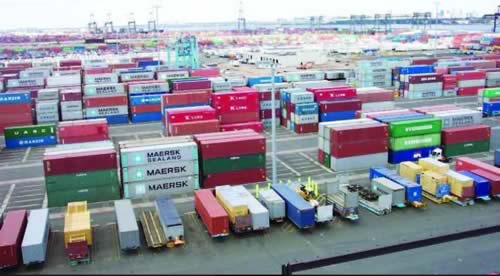The maritime sector in Nigeria, with its estimated worth of about $8 trillion, has long been touted as a potential economic powerhouse. However, a closer look reveals a complex web of challenges that have hampered its development, resulting in significant revenue losses and hindered growth. In this comprehensive analysis, we delve into the multifaceted issues plaguing the Nigerian ports, examining the impact of policies, infrastructure deficiencies, and operational setbacks on the nation’s maritime landscape.
Policy Failures and Revenue Loss:
In a sunlit snapshot at the Ports and Terminal Multipurpose Limited Port, the plight of clearing agents unfolds. Mr. Johnpaul Ejiogu, a clearing agent, grapples with a 200% surge in the cost of clearing a 2008 Mercedes Benz for his client, attributing the predicament to currency fluctuations and policy inconsistencies. The Council for the Regulation of Freight Forwarding in Nigeria reports a stark decline in licensed agents and freight forwarders, from 1,924 in 2012 to approximately 7,000 in December 2023.
The Nigerian maritime industry’s potential, valued at $8 trillion, remains largely untapped due to unfavorable policies. Local importers, despite proximity to ports, resort to neighboring ports, bypassing governmental bottlenecks and diminishing national revenue. Eugene Nweke of the Sea Empowerment Research Centre points to inadequate physical development in Nigerian ports as a root cause, emphasizing the need for continuous expansion and modernization.

Impact of Forex Unification and Stringent Policies:
The forex unification and other stringent policies have created a challenging environment for freight forwarders and customs agents. Importers face escalated costs and are burdened with demurrage charges, exacerbating the strain on an already beleaguered system. A licensed customs agent, Mr. Decland Dinaobi, highlights the adverse effects of the Vehicle Identification Number policy introduced in 2022, contributing to a substantial backlog of abandoned vehicles at ports, resulting in revenue losses.
Revenue Leakage and Unclaimed Cargoes:
The issue of unclaimed cargoes at Nigerian ports compounds the revenue loss predicament. As of June 2023, an alarming 7,451 abandoned cargoes, including 3,200 units of overtime cars and 3,295 units of overtime containers, were reported at Apapa, Tincan Ports, and other terminals. Beyond the financial implications, the failure to clear these cargoes also underscores the inefficiencies in the clearance system.
Governmental Efforts and Infrastructure Challenges:
Despite these challenges, the Nigerian government has initiated measures to revitalize the maritime sector. Investments in barge operations and the approval of deep seaports, such as the $2.59bn Badagry Deep Seaport and the $1.5bn Lekki Deep Seaport, signal intentions to address infrastructure deficiencies. The electronic call-up system, Eto, introduced by the Nigerian Ports Authority, aims to streamline truck movement, though challenges persist with black-market interference.
The Urgency of Infrastructure Development:
Infrastructure challenges, including insufficient port depths and poor access roads, pose significant impediments to the sector’s growth. The Managing Director of the Nigeria Ports Authority, Mohammed Bello-Koko, pledges $1 billion for port infrastructure development, with a planned kickoff in the first quarter of 2024. The dilapidated access roads prompt the Minister of Marine and Blue Economy, Mr. Adegboyega Oyetola, to express concern about the high transportation costs, prolonged transit times, and heightened accident risks.
The Role of Port Community Systems and Governmental Initiatives:
A World Bank report underscores the importance of functional Port Community Systems (PCS) in enhancing port operations. While PCS implementation has proven successful in other ports globally, Nigeria is yet to fully integrate this technology. The government’s introduction of the electronic call-up system, Eto, and plans for the $1 billion Ondo Deep Seaport demonstrate efforts to modernize and improve efficiency.
Conclusion:
The challenges facing Nigeria’s maritime sector are intricate and multifaceted, requiring a comprehensive and strategic approach for sustainable solutions. As the government strives to diversify the economy and maximize the potential of the maritime industry, addressing policy inconsistencies, enhancing infrastructure, and embracing technological advancements such as Port Community Systems will be crucial. The future success of the Nigerian ports hinges on collaborative efforts, innovative solutions, and a steadfast commitment to overcoming the obstacles that have hindered their growth.
Support InfoStride News' Credible Journalism: Only credible journalism can guarantee a fair, accountable and transparent society, including democracy and government. It involves a lot of efforts and money. We need your support. Click here to Donate
